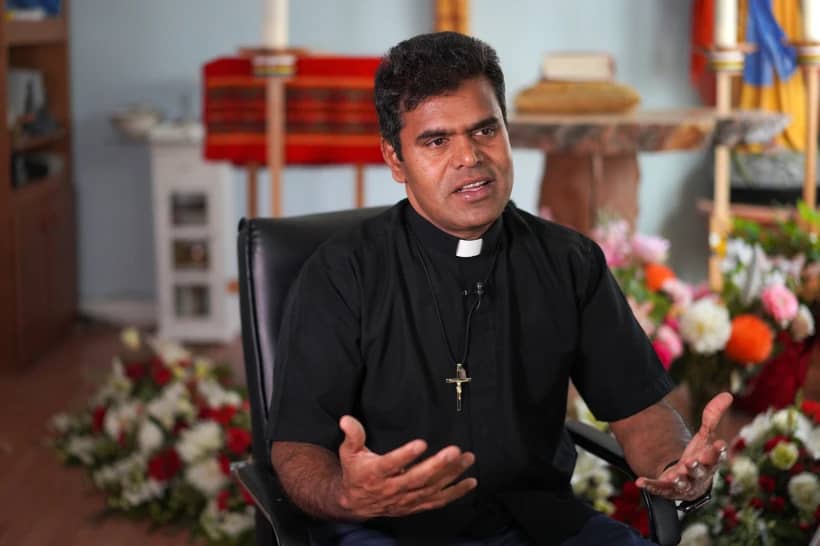São Paulo, Brazil – Evangelical politicians have introduced bills in states and towns all over Brazil to promote sexual abstinence among teens, boosted by a wave of conservatism in the country under President Jair Bolsonaro. Catholic reaction has been with mixed, as Charismatic Catholic Renewal movements generally support the measures while bishops have been mostly silent.
The most recent, and notorious, proposition was made by a city lawmaker in São Paulo. Rinaldi Digilio, a Foursquare Church minister and a member of the Social Liberal Party (PSL) with which Bolsonaro was affiliated when he was elected in 2018, presented a bill in order to create an “I Chose to Wait Week” in Brazil’s most populous city.
Digilio’s idea is to introduce dates in the school calendar to discuss teenage pregnancy prevention. The bill’s name alludes to a well-known campaign in Brazil, “I Chose to Wait,” created years ago by the Evangelical pastors Nelson Junior and Angela Cristina. They lead an institute that has the same name and have been promoting sexual abstinence before marriage throughout the country.
In São Paulo State, lawmaker Leticia Aguiar, also a member of PSL, presented a bill to establish a state-wide “I Chose to Wait” program. Aguiar argues it’s “not about sexual abstinence and does not aim at suspending the right to or replacing existing contraceptive methods.” The idea, she says, is to raise awareness on “the potential consequences of premature pregnancy.”
Damares Alves, Bolsonaro’s Minister of Women, Family, and Human Rights, created a similar campaign in February of 2020. An Evangelical pastor, Alves said it was the first step in the establishment of a “program of premature sex prevention.” Her initiative ended up being eclipsed by the COVID-19 pandemic.
While some healthcare experts have criticized such initiatives as ineffective in the prevention of sexually transmitted infections and pregnancy, the Catholic Church has been mostly on the sidelines. Most bishops have not publicly expressed an opinion on those bills, with only a few individual statements among rank-and-file clergy.
The exception has been Catholic charismatic movements, with some outspoken supporters of abstinence campaigns. That’s the case of Canção Nova (New Song), a Catholic community that owns radios and TV stations.
The group has traditionally organized over several years the Revolution Jesus Camp, gathering thousands of teenagers to reflect on Catholic values, including sexuality. In 2015, one of the conferences during the camp was ministered by Pastor Nelson Junior.
In the opinion of Tabata Tesser, a sociologist and member of the feminist group Catholics for the Right to Decide, the bills promoting sexual abstinence unduly combine religion and public policies.
“It is harmful for democracy because the public that is the target of such policies, the youth, is not considered. What we really see is that the youth has been experiencing sexuality,” she said.
Tesser argued that abstinence does not work even among religious people and the clergy, so it should never be adopted as the foundation of a governmental policy to avoid teenage pregnancy.
“We have a much more profound solution at hand, which is sexual education and the discussion of gender violence in schools. But those segments oppose it,” she said.
Tesser was one of the organizers of a demonstration in front of Sao Paulo’s city council on July 6 against Digilio’s bill. The protestors, including members of Catholic and Evangelical movements, were dressed up as Handmaid’s Tale characters.
Traditionalist Catholic movements such as the Institute Plinio Corrêa de Oliveira (known by its acronym IPCO) do not see a problem in showing support to an originally Evangelical initiative.
“During a fire, those who throw water to extinguish it are allies. At this moment, the Christian Civilization is facing its worst crisis, and the family is being attacked from all sides,” IPCO spokesman Frederico Viotti told Crux.
Viotti emphasized that the inspiration of the sexual abstinence campaigns came from the United States’ Protestant milieu, but in Brazil they have been adopted by Catholics.
“The propositions to incentivize abstinence, that is, chastity before marriage, are in line with the Catholic doctrine on such matter and collaborate to defend the family,” he affirmed.
In the opinion of Francisco Borba Ribeiro Neto, director of the Pontifical Catholic University of São Paulo’s Center of Faith and Culture, a plural and diverse state should include campaigns against the “excessive erotization in society.”
“All possibilities must be presented to the young people, so they can compare them and choose the one they prefer,” he told Crux.
The Church’s silence on the Evangelical bills, in Borba’s opinion, is explained by the fact that it has ceased to be the hegemonic religious group in Brazil.
“Catholics realized after many disillusions that a religion loses political power when it loses spiritual and moral power. The Evangelicals, on the other hand, think they lacked moral and spiritual power because they did not have political power,” he analyzed.
“Thus, the Catholic Church now tends to suspect of propositions in which the State appears as the advocate of a moral and cultural order, even if such order is favorable to Catholics. The Evangelicals tend to use the State to defend their moral and cultural convictions,” Borba compared.
While bishops keep a low profile, Bolsonaro’s backers have been working to unite the conservative segments of Catholicism and Evangelicalism, Tabata Tesser declared.
“Bolsonarism has created an ecumenical neoconservative pact,” she said.















